Back when I did a series on Peter Pan movies, in this blog’s early days, I only wrote about the three theatrically released ones and the various TV versions of the musical by Mark Charlap and Carolyn Leigh. Now I’d like to do two less iconic TV movie adaptations. To call them “less iconic” isn’t to say that no one has ever seen them or liked them. They each won an Emmy after all. Still, compared to some other Peter Pans, I don’t hear many people talking about them. As you’ve doubtless guessed by now, I think they deserve a little more appreciation. Mind you, I think they deserve some criticism too.
Peter Pan (1976)

I initially assumed this television musical starring Mia Farrow as Peter and Danny Kaye as Mr. Darling/Captain Hook was made to compete with the 1960 Mary Martin version. To my (mild) surprise, both were actually made by NBC.[1]Actually, the 1976 movie was a British-American collaboration between ITV and NBC. This one definitely follows in the prior musical’s footsteps, especially when it comes to song ideas. There’s a bedtime prayer sung by Mrs. Darling (Virginia McKenna) and her children before she leaves for her party. Peter Pan sings a celebratory song once he gets his shadow reattached. He sings another song about flying as he teaches Wendy (Briony McRoberts), John (Ian Sharrock) and Michael (Adam Stafford) how to do so. There’s a song and dance done by Tiger Lily (Paul Kelly) and her tribe as our introduction to them. You get the idea.
Unlike the 1960 TV musical, this one only aired once and that’s kind of sad in my opinion. While neither movie is exactly to the tastes of modern audiences, I feel like the 1976 Peter Pan is superior to the 1960 one in most aspects. Not every aspect, mind you, but most. It begins, more or less, with footage of Kensington Gardens, Peter’s early stomping grounds according to J. M. Barrie[2]If these aren’t the real Kensington Gardens, they’re a pretty impressive recreation., and voiceover narration from an actor no less distinguished than John Gielgud.
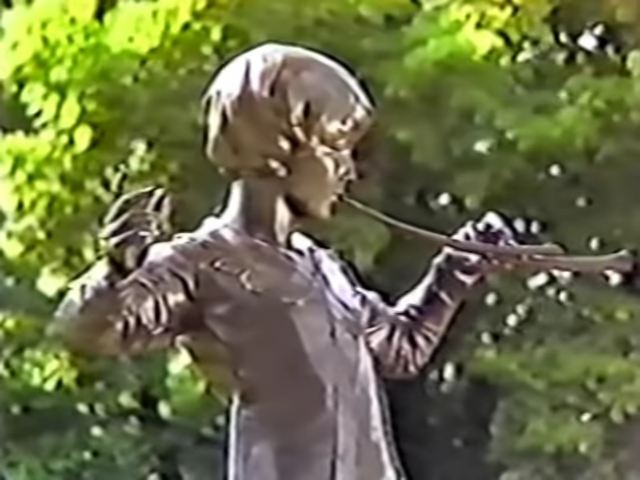
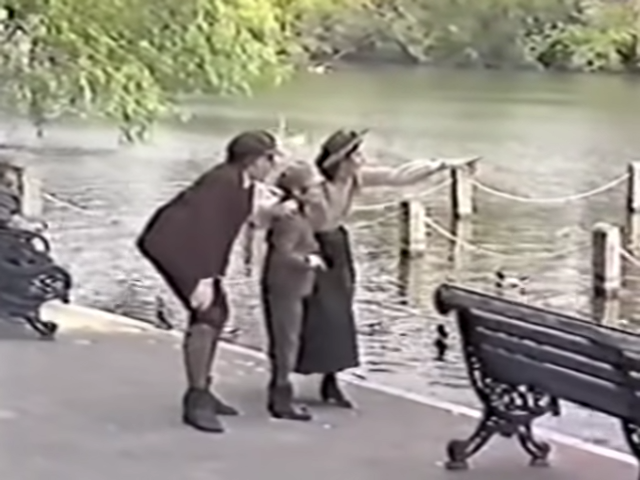

While the sets for the rest of the movie are obviously sets, they’re still much more elaborate and visually appealing than the ones from the 1960 Peter Pan.
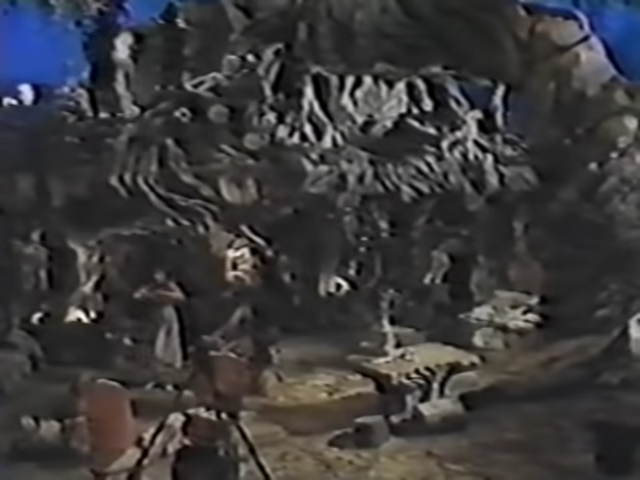
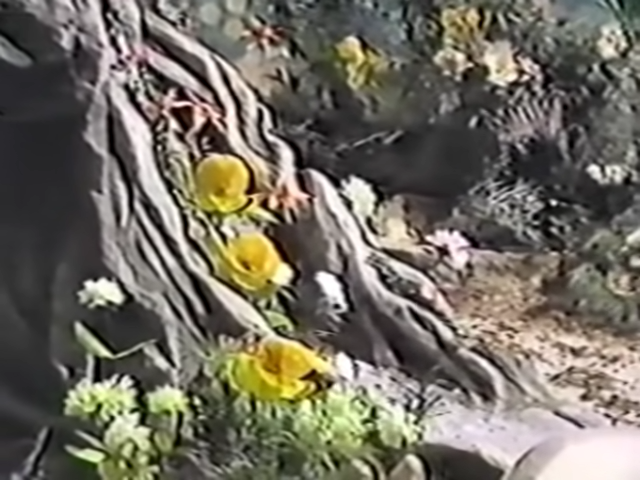
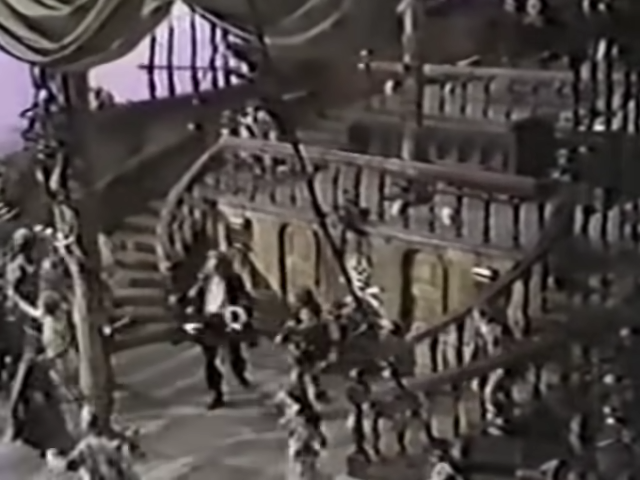
While the scripts for both musicals take most of their dialogue from Barrie, I think this one by Peter Pan/Barrie scholar Andrew Birkin[3]Interestingly, he wasn’t yet a scholar on those subjects when he wrote this script. He became one later when doing research for his 1978 biographical miniseries, The Lost Boys. makes better choices or at least more interesting ones.[4]Like the 1953 Disney movie, it has the Lost Boys ultimately decide to stay in Neverland. That’s the only way in which the 1960 musical is closer to the source material. For what it’s … Continue reading For example, it intercuts the Darlings’ joyful flight from their nursery with their loving parents returning to find them gone, leaving us with mixed feelings that are true to the spirit of the source material.
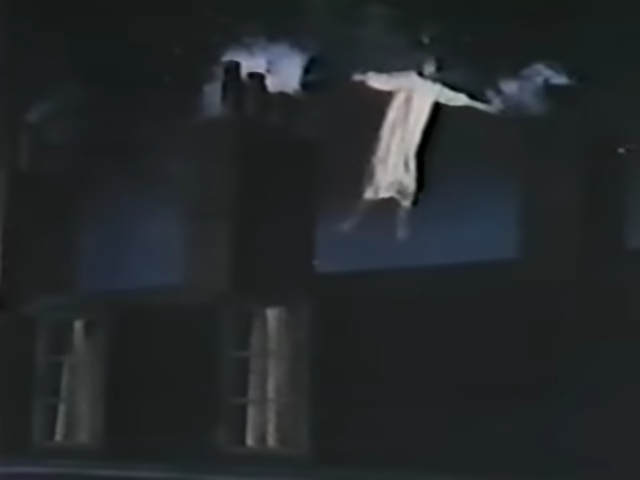
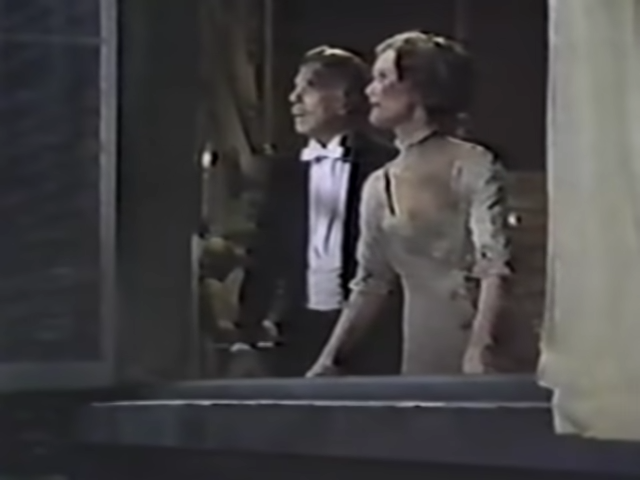
Also, while none of the character portrayals in this Peter Pan are my favorites, I enjoy all the acting more than that of the other musical.[5]Nicholas Lyndhurst, who plays one of the Lost Boys, would grow up to play Uriah Heep in my favorite David Copperfield adaptation! Some might suggest that’s because the acting in the 1976 musical is more realistic and less theatrical than in the 1960 one but I don’t think that’s entirely the reason. The performances in the 2000 restaging of the Mary Martin musical, which was actually filmed onstage before a big audience, are just as hammy and I love them.
There’s really only one thing about this Peter Pan musical that strikes me as inferior to the other one. Unfortunately, it’s something pretty big. The songs are by Anthony Newley and Leslie Bricusse who also did the songs for Willy Wonka and the Chocolate Factory.[6]Bricusse’s other credits include Scrooge (1970) and Doctor Dolittle (1967.) I didn’t care much for that movie’s songs, but these are even less memorable.[7]OK, maybe the better ones are better than the worst song from Willy Wonka. I wasn’t a fan of the songs from the 1960 Peter Pan either, but I’ll admit most of them are probably more fun in their corny way than the similarly corny 1976 songs.[8]The Peter Pan musical with the best songs that I’ve found is the one by George Stiles and Anthony Drewe who contributed original songs to the stage adaptation of Mary Poppins. In particular, Flying is catchier than its counterpart here, When You Can Fly. Both musicals (though at different points) have Peter sing a wistful solo that doesn’t fit with his general character but If I Could Build a World of My Own makes even less sense than Distant Melody. Peter basically has built a world of his own in Neverland! His 1960 counterpart singing about a lullaby he vaguely remembers his mother singing to him sort of made sense. (The problem was arguably more that it didn’t fit in with the overall tone of the movie.) I wonder if the 1976 song was originally written for and cut from a totally different musical and the songwriters were so attached to it that they had to put it somewhere.
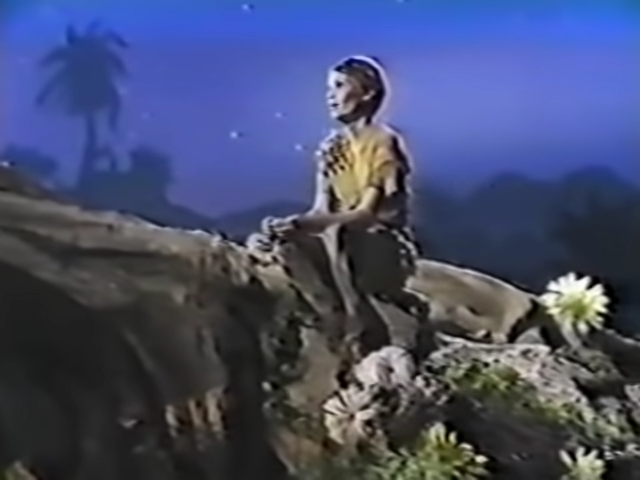
Still, the soundtrack isn’t dreadful or anything. The opening numbers gets points for being sung by Julie Andrews(!) and it might have a better tune than most of the others too. Capt. Hook’s songs do have some clever wordplay and one of them, They Don’t Make ‘Em Like Me Anymore, is catchy though the meter sometimes strikes me as awkward.
Of all the cutthroat pirate kings who plagued the seven seas,
Quite the most appalling one to be
Is me.
(You’re telling me!)
The only old Etonian who flies the skull and cross bones,
Davy Jones’s favorite crook,
Captain Hook.
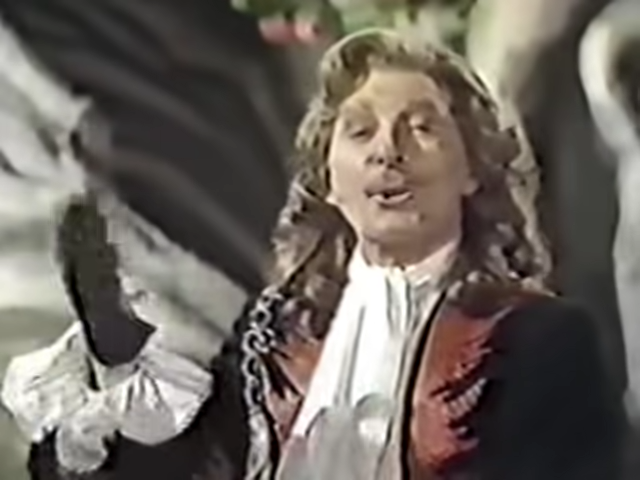
While I can’t say that most of this Peter Pan‘s songs are better as songs than those from 1960, I will argue that some of them are more interesting, dramatically speaking. In one of the only ones that doesn’t have an obvious counterpart from the Mary Martin musical, the Lost Boys sing dismissively about all the annoying things about mothers before ultimately admitting that each of them wishes he had one. Later, when Hook and his crew plan to make Wendy their mother, they sing a reprise of this song. You could argue this is untrue to J. M. Barrie who wrote in the stage direction for his play that the Lost Boys are only casually interested in their mothers “who are now as important to them as a piece of string” and in his novelization of it that “they knew in what they called their hearts that one can get on quite well without a mother and it is only the mothers who think you can’t.” Still, this adaptation’s take on the characters’ feelings is intriguing and works on its own terms. Back in 1960, Peter sang a cheerfully defiant anthem about not growing up. In 1976, albeit at a different point in the story, he sings a bitter diatribe about the loss of youth. I can’t say the resulting song is better than I Won’t Grow Up as a song, but again I find it more interesting.
In my series on Peter Pan adaptations, I made it a rule to only do straightforward retellings, not modern twists on the material. But this post isn’t really part of that series and I’m going to write about one that comes close to being both a modern twist and a straightforward retelling. Confused? Keep reading.
Peter and Wendy (2015)[9]Not to be confused with the 2023 Disney+ movie Peter Pan and Wendy.
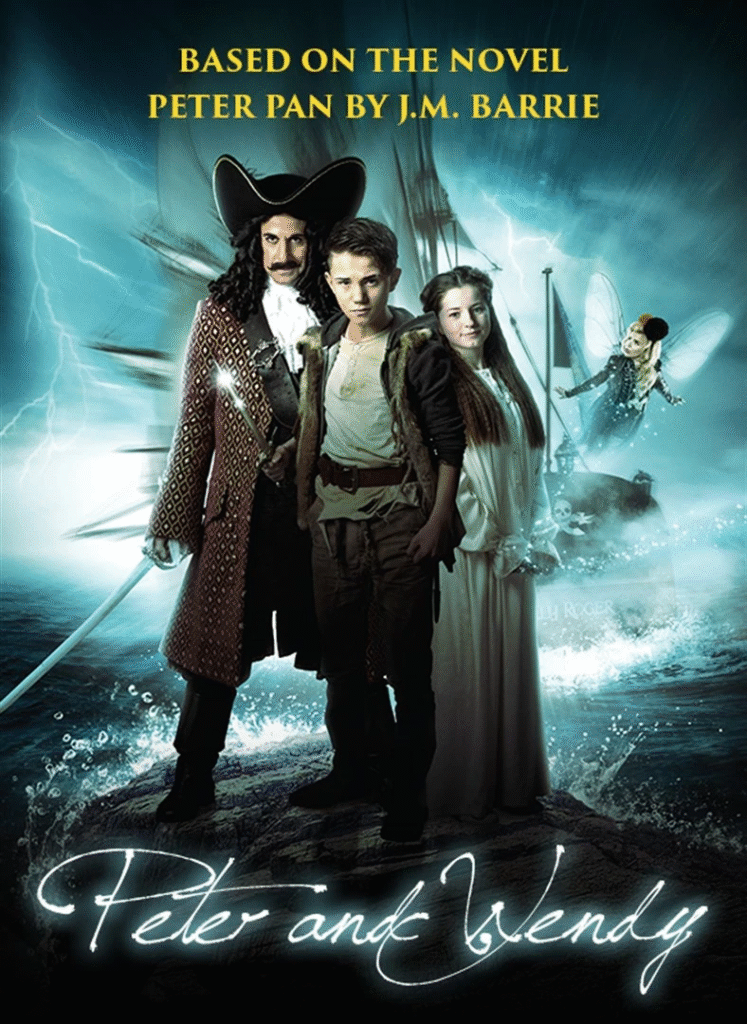
“Of Peter himself you must make what you will. Perhaps he was a little boy who died young, and this is how the author conceived his subsequent adventures.”-J. M. Barrie
This ITV film was written by Adrian Hodges who also wrote my favorite David Copperfield adaptation and directed by Diarmuid Lawrence who was also one of the directors of my favorite Little Dorrit adaptation (although there’s not as much competition for that honor.)[10]Lawrence also directed an adaptation of Emma that’s decidedly not my favorite, but let’s not hold that against him. It tells the story of Lucy Rose (Hazel Doupe), a modern young teen with a critical heart condition. To undergo a risky surgery, she is admitted to the Great Ormond Street Hospital for Children to which J. M. Barrie left the rights to Peter Pan. A twinkly eyed old man (Bjarne Henrikson) gives her a first edition copy of the novel to read. She initially dismisses it (not angrily) as being for little kids, but she ends up reading it aloud to younger patients at the hospital and gets sucked into the story. “It’s funny,” she explains, “and a bit sadder than I remember.”
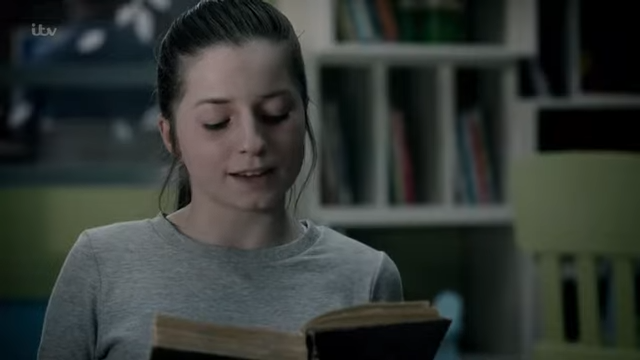
As Lucy and the other kids bring the tale to life in their imaginations, Lucy’s mother (undervalued actress Laura Fraser) becomes Mrs. Darling, Dr. Wylie (Stanley Tucci) and his team, who are to perform Lucy’s operation, become Capt. Hook and his crew[11]Coincidentally or not, Wylie is also the last name of the heroine of J. M. Barrie’s play, What Every Woman Knows. and pop singer Paloma Faith, of whom Lucy is a fan, becomes Tinker Bell. I love the contrast in this adaptation between the tinkly, bell-like sound of the fairy language and the somewhat vulgar content of Tink’s subtitles.
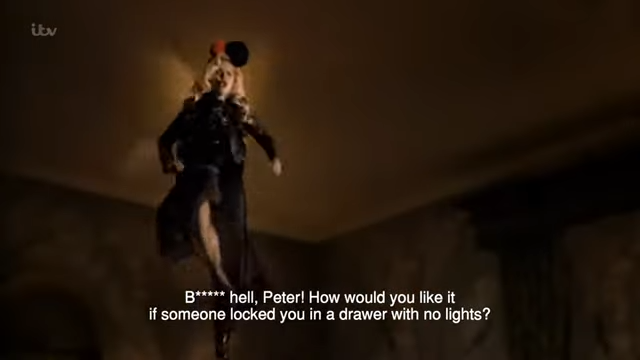
The boys at the hospital become John (Maurice Cole), Michael (Patrick Williams) and the Lost Boys. Lucy herself becomes Wendy and the movie cuts back and forth between her in critical condition and Wendy and other characters in danger. As the movie proceeds, we start to wonder if everything with Peter Pan is really in her imagination. A throwaway line from the book, which this film cites, is that according to in-universe stories, “when children died, (Peter) went part of the way with them so that they should not be frightened.” Is that what he’s doing to Lucy?!
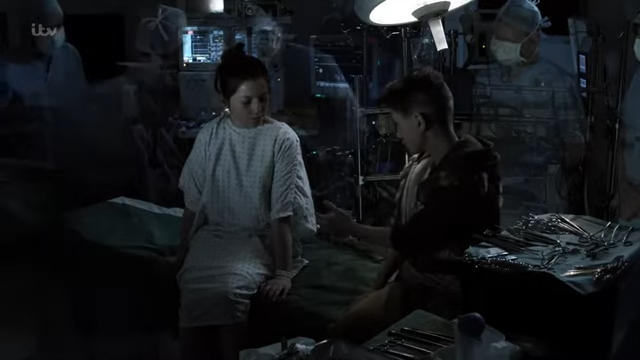
Intentionally or not, this movie resembles the 2003 Peter Pan in many ways. Both of them portray Wendy as more of an action heroine and both even have her tell a version of Cinderella that makes her the same. Both embrace the tragic aspect of Peter (Zak Sutcliffe) and Wendy’s doomed relationship. Both have John and Michael briefly encounter the ticking crocodile when they’re separated from Peter and Wendy.[12]By the way, while John is traditionally portrayed as wearing glasses, this is the only version I’ve seen where both he and Michael are bespectacled. And both have children all over the world (or the English-speaking parts of it anyway) express their belief in fairies to save Tinker Bell, as in the novelization, rather than rely on viewer participation as in the stage play. I sometimes think I might like Peter and Wendy’s version of that scene better than the earlier adaptation’s since it’s less self-indulgent though I really do like the music from the 2003 scene.
What’s not so like Peter Pan (2003) is Capt. Hook. Whereas Jason Issacs’s pirate captain was creepy with only an undertone of camp, Stanley Tucci’s is a completely comic figure. Even when this Hook is killing one of his crew (Asim Chaudhry) for accidentally spitting on his boots, he fails to be even as intimidating as Hans Conried’s technically more bumbling Hook from the 1953 movie. I might have preferred a more menacing, though still funny, take on the character but I can’t complain. You see, while the pirates have more original dialogue than any of the other characters, they’re hilarious. “Educational standards were higher in my day, Mr. Smee,” Hook laments at one point. “Back then, being a pirate was all about hard work! It was blood, sweat and tears. Mainly blood.” Smee (Rasmus Hardiker) says that he got an F on his entrance exam. “They said it stood for fantastic,” he adds proudly. Later, two other pirates (Gershwyn Eustache Jr. and Ricky Champ) praise Hook for never having them lashed without a good reason “even if he won’t tell you what the reason is.” I’d better stop before I spoil all these characters’ great lines.
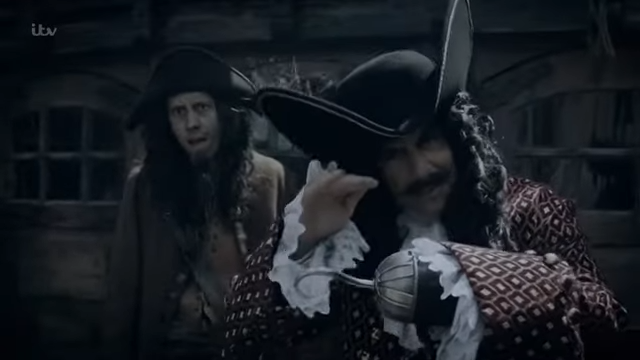
Unfortunately, the mention of Hook brings me back to some things I don’t think work as well about this movie. For the most part, I think the connection between the fantastical scenes and the realistic scenes is great. For example, the interior of the Darlings’ nursery looks like, well, a nursery but when the children take flight out the window, it becomes a window in the Great Ormond Street Hospital, and they soar over a modern-day London. The implication seems to be this is what the patients wish they could do.
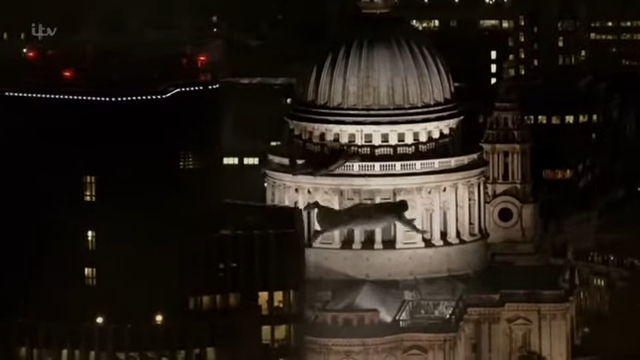
And Marooners’ Rock, a place of refuge for weary swimmers but a death trap with the changing of the tide, is made up of hospital beds and operating tables.
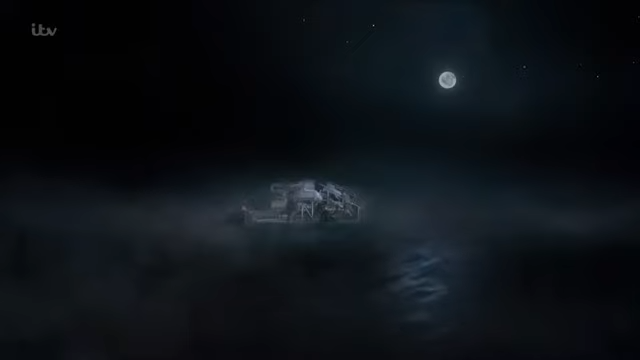
But there doesn’t seem to be much of a reason why Dr. Wylie should be Capt. Hook. He’s a tad prickly, mind you, but a benevolent character who has a good relationship with Lucy. Maybe the idea is that she subconsciously resents him because of she resents being at the hospital in general or she’s worried about the surgery he’s going to perform. Or is it because Mr. Darling and Hook are traditionally portrayed by the same actor and Lucy’s divorced mother is attracted to Wylie? It’s not clear what the double casting is supposed to mean in the play or movies that use it, if it’s supposed to mean anything at all, and I don’t really have a problem with that there. But it feels like it should mean something specific in this film, given the style. It might make sense if Lucy didn’t want her mom to date again. In that case, Wendy returning to her father could symbolize Lucy accepting it. But as it is, she encourages her mother right from the beginning. Maybe it’s a subconscious thing? When she and her mother have a brief argument about her father in an early scene, Mum says, “you always defend him.” If I’d been writing the movie, I might have made Lucy be estranged from her father herself and had him be Hook. As it is, I guess this particular double role can be argued into coherence.
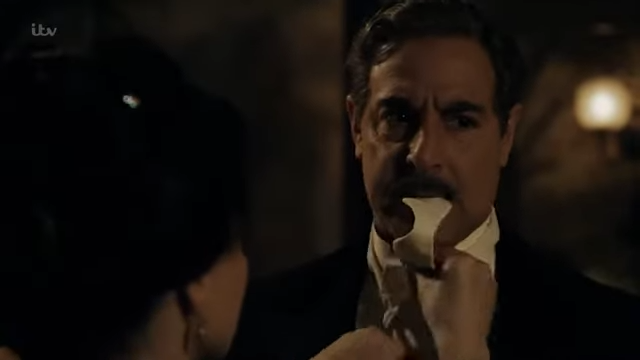
My least favorite thing about the film is regrettably Zak Sutcliffe as Peter Pan himself. I get that the movie wants to delve into the darker aspects of the source material but even when he’s smiling, this Peter seems oddly subdued and lacking in gaiety. I prefer Jeremy Sumpter’s Peter who was angstier than some Pans but still playful. For that matter, so was Mia Farrow’s. Even Cathy Rigby’s ultra exuberant Peter Pan had some well-done sad moments. Actors and adaptations don’t need to choose one or the other.
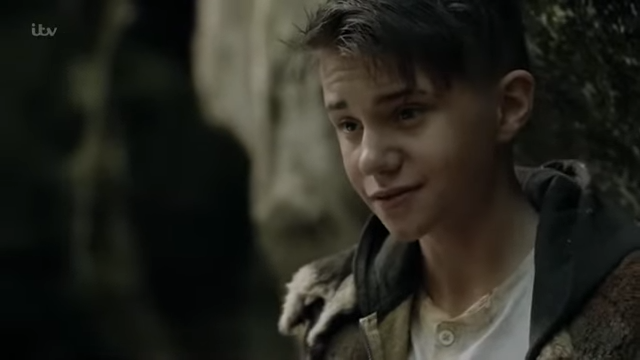
If you’re wondering to whom Peter corresponds in Lucy’s regular life, in a rare scene at her home, we get a look at a photo of her and a boy who is played by the same actor. The implication seems to be that he was a friend or boyfriend of Lucy’s who died, tying into her being told that J. M. Barrie based Peter on his brother who died young and therefore never grew up.[13]I’m not sure if that’s actually true or just speculation on the part of biographers by the way. It might be true though. “Not a bad way to remember someone you loved,” another character says.[14]Going by this interpretation, Wendy regretfully leaving Peter and Neverland to grow up signifies that while part of Lucy wishes to join her friend or boyfriend in the afterlife, a larger part of her … Continue reading It all makes sense, but I wish the movie could have been a trifle more explicit. I’m not saying I want everything spoon fed to me, but it didn’t actually occur to me that the boy in the photo might be supposed to be deceased until someone online suggested it. A single line of dialogue to imply it wouldn’t have had to be too heavy handed.
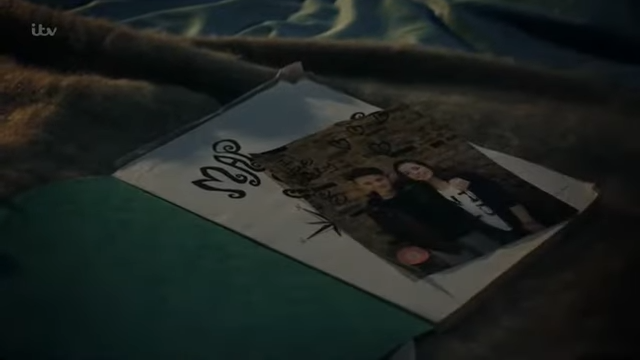
Ending spoilers in this paragraph. In addition to being a tribute to Peter Pan, this movie is also a tribute to the Great Ormond Street Hospital for Children. I like that it shows us one child whom the doctors are able to save and one whom they aren’t, acknowledging that not all stories about hospitals have happy endings but some do.
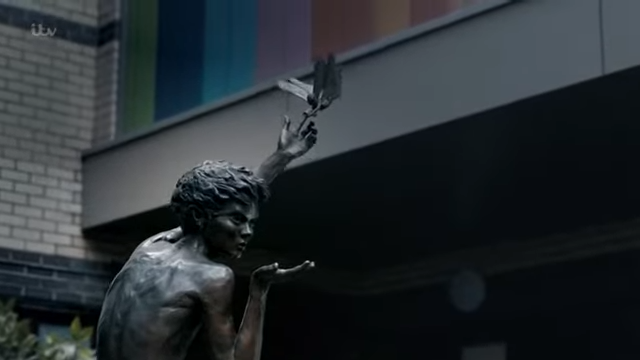
I’ve written before that Barrie was a naturally ambiguous writer. While on the surface, Peter Pan seems like it’s saying that growing up is a necessary evil at best, it’s so upfront about the bad things about kids that the thoughtful reader can’t help but suspect it’s being ironic. On the other hand, to unequivocally describe the parts that celebrate or seem to celebrate childhood as ironic is also an oversimplification. It used to be that Peter Pan movies would take the position that being a kid is better than being an adult. (cf. Peter Pan (1953), Peter Pan (1960), Return to Neverland (2002.)) [15]Then again, the 1953 movie does end with Wendy telling her father she’s ready to grow up and the 1960 ends with the Lost Boys cheerfully singing that they will grow up after all. Still, in … Continue reading More recent takes have gone the opposite route, proclaiming that growing up is something to be embraced. (cf. Peter Pan (2003), Wendy (2020), Peter Pan and Wendy (2023.)) [16]I think the last Peter Pan-related movie to be anti-growing up was Finding Neverland (2004.) If I recall correctly, Hook (1991) spends most of its runtime being pro-childhood and anti-adulthood but … Continue reading This film is the only one to really capture the neutrality of the source material. Of course, much of that is due to it focusing less on the theme of youth vs maturity and more on the less obvious theme of mortality. But that brings me to something else I enjoy about Peter and Wendy.
Sometime ago I wrote about how some adaptations function as commentaries on the original work, more so than adaptations always do, using Peter Pan (2003) and Little Women (2019) as examples. I argued that such adaptations can be fun and interesting and can draw viewers’ attention to things about the source material they might not have noticed otherwise but they run the risk of misrepresenting the original authors’ intentions and can make reading their original work anticlimactic. The nice thing about Peter and Wendy is that, unlike the 2003 Peter Pan or, for that matter, the 2019 Little Women, it doesn’t pretend that it’s anything other than the subjective imaginings of modern readers. Those movies started out as, more or less, straightforward adaptations and by the end, for better and for worse, the specific interpretations of the adapters had taken over. Peter and Wendy, on the other hand, puts the fact that what we’re seeing is what someone is imagining based on the book front and center. Thus, we get things like Indian princess Tiger Lily (Natifa Mai) being Hindi rather than American and Capt. Hook being described as “worse than Capt. Jack Sparrow” rather than being compared to Flint and Barbecue AKA John Silver. There’s not much danger of anyone watching this movie and assuming it’s exactly what J. M. Barrie intended. Peter and Wendy gives us the specific pleasures of a commentary-type adaptation while minimizing the drawbacks.
And now I think I’ve got the Peter Pan bug out of my system.
References
| ↑1 | Actually, the 1976 movie was a British-American collaboration between ITV and NBC. |
|---|---|
| ↑2 | If these aren’t the real Kensington Gardens, they’re a pretty impressive recreation. |
| ↑3 | Interestingly, he wasn’t yet a scholar on those subjects when he wrote this script. He became one later when doing research for his 1978 biographical miniseries, The Lost Boys. |
| ↑4 | Like the 1953 Disney movie, it has the Lost Boys ultimately decide to stay in Neverland. That’s the only way in which the 1960 musical is closer to the source material. For what it’s worth, I understand why the decision was made since showing all the Boys being adopted by the Darlings is complicated. |
| ↑5 | Nicholas Lyndhurst, who plays one of the Lost Boys, would grow up to play Uriah Heep in my favorite David Copperfield adaptation! |
| ↑6 | Bricusse’s other credits include Scrooge (1970) and Doctor Dolittle (1967. |
| ↑7 | OK, maybe the better ones are better than the worst song from Willy Wonka. |
| ↑8 | The Peter Pan musical with the best songs that I’ve found is the one by George Stiles and Anthony Drewe who contributed original songs to the stage adaptation of Mary Poppins. |
| ↑9 | Not to be confused with the 2023 Disney+ movie Peter Pan and Wendy. |
| ↑10 | Lawrence also directed an adaptation of Emma that’s decidedly not my favorite, but let’s not hold that against him. |
| ↑11 | Coincidentally or not, Wylie is also the last name of the heroine of J. M. Barrie’s play, What Every Woman Knows. |
| ↑12 | By the way, while John is traditionally portrayed as wearing glasses, this is the only version I’ve seen where both he and Michael are bespectacled. |
| ↑13 | I’m not sure if that’s actually true or just speculation on the part of biographers by the way. It might be true though. |
| ↑14 | Going by this interpretation, Wendy regretfully leaving Peter and Neverland to grow up signifies that while part of Lucy wishes to join her friend or boyfriend in the afterlife, a larger part of her wants to live. |
| ↑15 | Then again, the 1953 movie does end with Wendy telling her father she’s ready to grow up and the 1960 ends with the Lost Boys cheerfully singing that they will grow up after all. Still, in 1953, Wendy’s father tells her there’s plenty of time for that and the last line of spoken dialogue in the 1960 musical is Peter telling her she’s now too old to go back to Neverland. |
| ↑16 | I think the last Peter Pan-related movie to be anti-growing up was Finding Neverland (2004.) If I recall correctly, Hook (1991) spends most of its runtime being pro-childhood and anti-adulthood but ultimately subverts it. |
